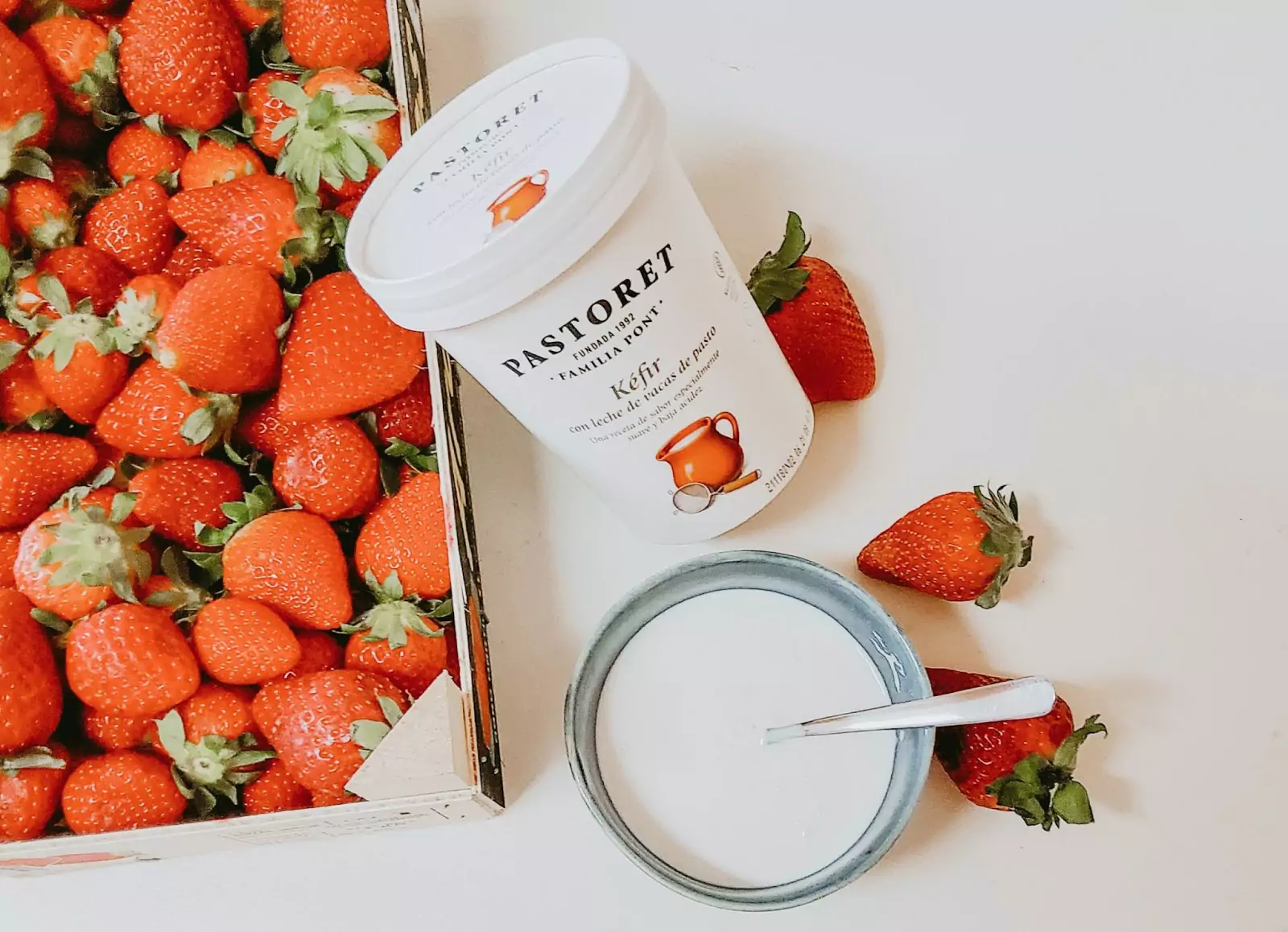The Health Benefits of Adding Fermented Foods to Your Diet

Key Takeaways
Last week, we told you all about soy and its benefits for your health. Among some of the popular soy foods we mentioned, you may have noticed miso and tempeh, which also fall into another interesting category—fermented foods.
Fermented foods are a rich source of probiotics, which are live microorganisms with a range of health benefits, including improved digestion, a strengthened immune system, and reduced inflammation.
A Growing Trend

The consumption of fermented foods, especially typically ‘unfamiliar’ ones like kimchi and kombucha, is growing in the US. And with all their health benefits, it’s no surprise. In addition to being a good source of probiotics, as we mentioned, fermentation also breaks down food into easier-to-digest nutrients, making fermented foods an excellent choice for people with digestive issues.
If you’re trying to improve your gut health, adding fermented foods to your diet may be a good idea. But before adding fermented foods to your cart at the grocery store, read on to find out what they are, how they benefit your digestive system, and then scroll down to pick from our ten favorite types.
What Is Fermentation?
What even are fermented foods? Have you ever tried them? If you’ve ever tried kombucha, dipped a spoon into the kimchi at an Asian restaurant, or attempted to reap the benefits of a kefir drink, the answer is yes.
Fermented foods have been used for centuries to preserve food, but recent interest in the process has centered on its potential health benefits for digestive and overall health.
There are many different fermented foods, and each offers its own unique set of health benefits. But before we go into those, let’s take a minute to focus on fermentation itself.
During fermentation, natural bacteria feed on the sugar and starch in food, creating something known as lactic acid. In a nutshell, the fermentation process involves using bacteria and yeast to convert carbohydrates into alcohol or acids. It preserves food and creates a distinct taste and aroma, and makes it easier for your system to digest the now nutrient-rich food.
Why Are Fermented Foods so Good For You?

Now that we know what fermentation is and how fermented foods are made, you should know more about how they can benefit your health. There are many reasons to eat these foods, from lowering your risk of high blood pressure to protecting you from inflammation.
Here are just a few of the health benefits you can enjoy from eating fermented foods:
1) They Add Probiotics to Your Diet
Fermented foods are considered healthy due to the active cultures of beneficial bacteria called probiotics produced during fermentation. These are often known as "good" or "helpful" bacteria because they help keep your gut healthy by maintaining the balance of good and bad bacteria in it.
Fermented foods are often rich in probiotics, which, as the NIH found during a survey in 2012, nearly four million Americans had tried. It also found that probiotics or prebiotics were the third most common dietary supplement.
They may reduce inflammation, boost immunity, help your digestive system, and even aid in weight loss for some. Probiotics (either in food or supplement form) are also an excellent way to heal your gut after you take antibiotics.
2) They Help with Digestive Health
The human gut is home to trillions of microbes, including bacteria, fungi, and viruses. This complex ecosystem plays a crucial role in digesting food, synthesizing vitamins, and protecting the body from disease.
Recently, there has been growing interest in the role of fermented foods in gut health. As we know, fermented foods are rich in probiotics, which are live microorganisms that can confer health benefits to the host.
As we mentioned above, these probiotics help restore the balance of gut bacteria, which can be disrupted by antibiotics, stress, and other factors. But they also have added benefits for your digestive health. They help break down dietary fiber and produce short-chain fatty acids, which promote gut health. These processes often result in reduced bloating and better digestion and even help prevent obesity.
3) They Encourage Microbiome Diversity
The gut microbiome is a collection of all the microbes (bacteria, yeasts, fungi, protozoa, and viruses) that live in your gastrointestinal tract.
This microbiome weighs around two kilograms and contains over a trillion microbes that have over 5,000 different species. The gut microbiome is vital for good health, encouraging and boosting nutrient absorption and mental health.
The microbiome is also essential for digestion and immunity. Recent research has shown that your diet can significantly impact the diversity of the microbiome. Here’s where fermented foods come in, which can promote a healthy balance of microbes in your system.
It's because of how fermented foods are made—by allowing microbes to break down carbohydrates and produce beneficial compounds like lactic acid and acetic acid. These acids help keep harmful bacteria in check while also promoting the growth of beneficial bacteria. As a result, eating fermented foods can help increase microbiome diversity.
4) They Support Your Immune System
In addition to supporting gut health, fermented foods have also been shown to boost immunity. One study found that people who regularly ate fermented foods were less likely to get sick than those who didn't eat fermented foods.
Fermented foods are teeming with beneficial microbes that can help to support a healthy gut. In turn, a healthy gut is essential for maintaining a strong immune system.
The digestive tract is lined with millions of immune cells that work to protect your body from harmful invaders. But for these cells to function correctly, they need a healthy population of gut bacteria.
Fermented foods can help replenish this good bacteria in the gut, keeping your immune system strong and protecting your body from illness.
5) They May Help with Blood Glucose Balance

Another benefit of fermented foods is that they can help to balance blood sugar levels. When your blood sugar levels are balanced, your body can use insulin better and store glucose as energy.
It’s because fermentation helps reduce the overall glycemic load of food, which is the measure of how much a food will raise your blood sugar levels. In addition, fermentation also increases the amount of fiber in food, which helps to slow down the absorption of sugar into your bloodstream.
When food is fermented, the sugars and starches in the food are converted into lactic acid by bacteria. It also breaks down complex carbohydrates and proteins into simpler compounds easier for the body to absorb.
In addition, the fermentation process also breaks down the sugars in food, making them easier to digest. As a result, fermented foods can help keep blood sugar levels more stable throughout the day. All of this can help prevent blood sugar-related health conditions like type 2 diabetes.
6) They Can Boost Brain Health
The fermentation process also creates beneficial compounds like lactic acid, which help preserve food and give it a characteristic tangy flavor.
Your body also produces lactic acid during exercise, which may improve brain function and protect against neurodegenerative disorders. In addition, fermentation increases the availability of vitamins and minerals, making fermented foods an excellent source of nutrients for your brain.
The gut microbiome we mentioned also factors in here. All that beneficial bacteria that help balance the gut microbiome can also help with cognitive function and mental health. Studies have shown that people with a healthy gut microbiome have a lower risk of developing dementia and other cognitive impairments.
Additionally, the probiotics in fermented foods can improve mood and reduce stress levels. So if you're looking for some brain-friendly foods, add fermented foods to your diet.
7) They Help You Maintain Good Oral Health
Fermented foods are teeming with beneficial bacteria that can help keep your mouth healthy due to their antimicrobial effects. These good bacteria, also known as probiotics, compete with harmful bacteria for space and food.
As a result, they help keep harmful bacteria levels in check, preventing them from taking over and causing problems like gum disease or bad breath.
Fermented foods also help stimulate saliva production, which can protect your teeth by washing away harmful bacteria and food debris.
In addition, the acids produced by fermentation can help break down plaque and tartar buildup on teeth. So incorporating fermented foods into your diet is a great way to maintain good oral health.
How Often Should You Eat Fermented Foods?

Fermented foods have so many benefits. They contain natural digestive enzymes, add magnesium, potassium, vitamin C, and vitamin K to your diet, promote good gut health, improve digestion, and boost immunity. There are many reasons to add them to your diet. But how often should you eat them? Can you eat too much fermented food?
Since there’s no one-size-fits-all when it comes to dietary and health care guidelines, there’s no definitive answer here. But the general recommendation is to consume fermented foods a few times per week.
It will provide your body with the beneficial bacteria it needs to stay healthy without overloading your system. And if you're new to fermentation, it's best to start slowly by incorporating a small amount into your diet and gradually increasing the frequency and quantity over time.
Remember, some people may experience side effects when they eat fermented foods. Those with autoimmune conditions like celiac disease or digestive disorders like IBS may experience bloating.
Some people may get headaches or food-borne illnesses from more unpasteurized fermented foods. Remember to consult with a health care professional and work with a registered dietitian before adding or eliminating any foods from your diet.
10 of Our Favorite Fermented Foods

There are a variety of foods that can be classified as fermented. Perhaps the most well-known fermented food is yogurt, which is made by adding live bacteria to milk. This process gives yogurt its characteristic tangy flavor and creamy texture.
Other common fermented foods include cheese, bread, and pickles. Cheese is made by adding bacteria to milk, which causes the milk to curdle and form a solid mass.
Bread is made by adding yeast to flour, which causes the dough to rise and results in a lighter, airier final product. Sourdough bread is a favorite amongst those looking for fermented bread. Pickles are made by soaking cucumbers in brine (saltwater).
Wondering what fermented foods to start adding to your diet? Here’s a list of our favorites:
- Kombucha: Kombucha is tea mixed with added sugar that's harvested every one to two months. The result is a pleasant, fizzy beverage. Remember, some people may have a larger glucose response to kombucha, so it's important to test for yourself.
- Kimchi: Kimchi is a typical Korean dish of salted and fermented vegetables with added seasonings.
- Miso: Miso is a soybean paste often used to make miso soup, which is a dish traditionally made in Japan using soybeans and dashi stock.
- Sauerkraut: Sauerkraut is made from cabbage fermented with lactic acid and bacteria.
- Greek Yogurt: A lacto-fermented food, Greek yogurt is strained to remove excess whey. This is what gives it that characteristically thick, creamy consistency.
- Apple Cider Vinegar: Apple Cider Vinegar is made from fermented apple juice and is often taken as a supplement, used in salad dressings, in marinades, and as a condiment.
- Pickled Vegetables: Dill and cucumbers are the most common pickled vegetable, but you can pickle almost anything!
- Kefir: Kefir is one of many fermented dairy products that’s growing in popularity lately. It’s made from kefir grains and consumed as a beverage, almost like a drinkable yogurt.
- Raw Cheese: Raw cheese (like Roquefort and French Brie) is a fermented dairy product that is just cheese that has not been pasteurized yet.
- Tempeh: Tempeh is a traditional Indonesian food that is made from fermented soybeans.
Find the right Nutrisense programto turn insight into progress.
Go Beyond Glucose Data with Nutrisense
Your glucose can significantly impact how your body feels and functions. That’s why stable levels are an important factor in supporting overall wellbeing. But viewing glucose isn't enough. Nutrisense, you’ll be able to learn how to use your body's data to make informed lifestyle choices that support healthy living.
One-to-one coaching
Sign up to access insurance-covered video calls to work with a glucose expert: a personal registered dietitian or certified nutritionist who will help tailor your lifestyle and diet to your goals.
Monitor and measure what matters
With the Nutrisense CGM Program, you can monitor your glucose with health tech like glucose biosensors and continuous glucose monitor (CGM)s, and analyze the trends over time with the Nutrisense App. This will help you make the most informed choices about the foods you consume and their impact on your health.
Find your best fit
Ready to take the first step? Start with our quiz to find the right Nutrisense program to help you take control.

Carlee's training at Western Illinois University and an internship at the Memphis VA Hospital lead her to a career in outpatient counseling and bariatric nutrition therapy. In these positions, Carlee realized many of the disease states (upwards of 80%!) her patients experienced were actually preventable. She knew she had to dig deeper into preventative health and has since been passionate about helping people translate this complex glucose data into actionable changes anyone can implement into their everyday lives.




